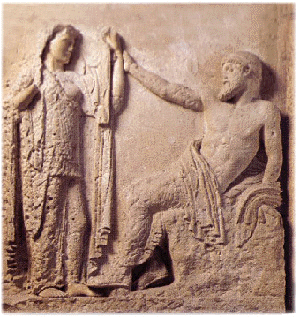 Twenty years ago, I hadn't ever read a book that referred to the divisions of years as anything other than BC and AD. Now it seems that every other book I read refers to them as CE and BCE. Which way should it be? Does it matter?
Twenty years ago, I hadn't ever read a book that referred to the divisions of years as anything other than BC and AD. Now it seems that every other book I read refers to them as CE and BCE. Which way should it be? Does it matter?I'm not even sure where BC (Before Christ) and AD (Anno Domini - In the year of our Lord) came from, but that's what I was always used to when I read history books. Until recently, when some scholars began referring to those eras as BCE (Before the Common Era) and (CE) Common Era. It offended me in my provincial sort of way, even though regardless of what terms were used, the same frame of reference was in effect--the birth of Christ.
And then I was called to active duty military service in Iraq, where the predominant religion believes that Jesus Christ was nothing more than a great prophet, and that because Allah needed no one beside him that he did not beget a Son. My world view began to open a bit, to where that doesn't bother me anymore.
At least I thought it didn't, until I began reading Muhammad: Prophet of God, by Daniel Peterson, Latter-Day Saint author and professor at LDS-Church-owned BYU. At the outset he uses the terms BCE and CE. Upon reading that, I was momentarily taken aback. I thought, initially, that it was okay for non-Christians to use that terminology, but for a Mormon, let alone a Christian? But the more I thought about it, the more I came to respect Dr. Peterson for using the terms.
It's not any doctrine of my church that we must use BC and AD, so what's the big deal, I've decided. Although recently Christianity has taken the spot as the largest general religious preference in the world, about 80+ percent of the world is not Christian. So I think it shows more respect to those other religions if we allow and even encourage the use of BCE and CE.
What is your opinion?
I've had both lines of thought like you described. I don't write much that requires me to use the epoch identifiers, so I don't have much practical worry about it, though in writing this comment I felt myself wanting to argue both sides of the debate.
ReplyDeleteIn favor of BC/AD:
* They are more readily visually distinguishable.
* Using the original names is more authentic and more obviously states the point of reference.
* Because that's what I learned growing up.
In favor of BCE/CE:
* It is awfully nice of non-Christians to agree to use our frame of reference for time so that we don't always have to calculate between different year systems. We can hardly begrudge them for acknowledging that they do it because it is "common" rather than because they venerate Person at the meridian.
* AD is particularly problematic for non-Christians as a designation because they don't accept that Jesus is their Lord. At least in the designation of BC, they can consider Christ as a personal name rather than a significant title.
It would be interesting to ask Dan Peterson why he chose to use CE/BCE. Maybe you should drop him a line and invite a comment.
We can agree on one thing: we need a common starting point for "time", whether it's Christ's birth or Mohammed's flight to Medina.
ReplyDeletePersonally, I would prefer that 1978 (the year Van Halen's first album was release) become year zero.
I was thinking more like September 1, 1990 becomes January 1, 0000. That way I could always remember (a) when my anniversary is, and (b) how many years I've been married.
ReplyDelete;-)
I thought the current calendar system was originally based on the start of the Roman empire and that it was conincidental that Jesus was born "on or about" that time. in fact I had heard that many scholars think Jesus might have been born ~4 years before 1 AD or CE whichever titly you want to use. I think it was later that Christians adopted the concept that our system was focused on the birth date of their savior.
ReplyDeletefollowup...sorry, referring back to the website
ReplyDelete(http://agards-bible-timeline.com/q4_ad_bc_ce.html)
you find the following quote:
"Dionysius did not want to perpetuate the name of Alexander, the Great Persecutor. He decided to start his 532 year cycle from the year associated with the foundation of Rome. At that time Christ’s birth was supposed to have occurred immediately preceding the year of the founding of Rome. Today, based on historical evidence relating to Herod and astronomical evidence relating to eclipses and star novas, most historians believe Christ was actually born a few years earlier.
Dionysius named the years relating to his cycle, BC meaning Before Christ which starts with year 1 and AD meaning Anno Domini, the year of Our Lord referring to the year of Christ’s birth. This is also a year 1. There is no year 0. (That’s the reason purists insists the 21st century actually began January 1, 2001. For example the first year began in 1 AD and ended the beginning of 2 AD so the first year of the 21st century begins in 2001 AD and ends with the beginning of 2002 AD)" So I was half right. But regardless, what would if profit anyone in todays society to use a different system to number the years if in every case they had to in parenthesis explain what it meant in the commonly used system of BC/AD?